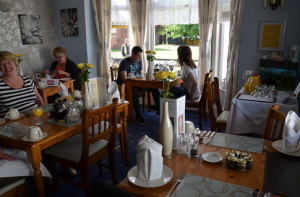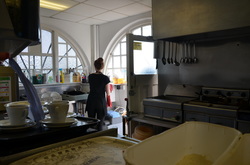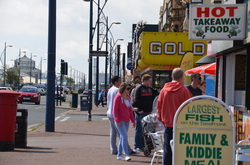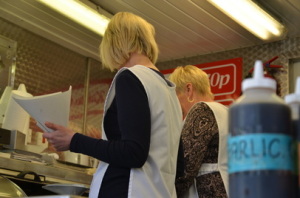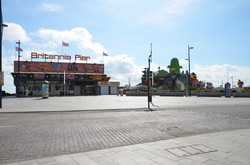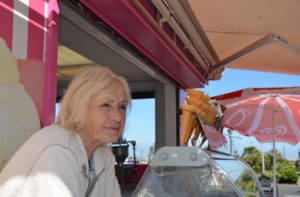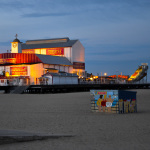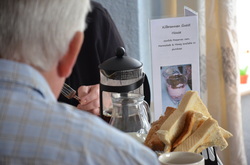
After almost two weeks of speaking with local business owners involved in the tourism sector, I have come to find that a broad spectrum of attitudes exist when it comes to running a business in Great Yarmouth’s current economic climate.
Smaller business owners tend to be more cynical about local tourism – often mentioning their frustration with a significant drop in foot traffic and the difficulty of attracting customers in the winter months. However larger local business owners, like Albert Jones of Pleasure Beach or Peter Jay of the Hippodrome, have a more positive view of local tourism. These movers and shakers of the local economy (as characterized by local economic experts) tend to view their position as one of power and one which allows them to bring in a surge of tourists during the summer months. While places like Pleasure Beach and the Hippodrome are what initially attract tourists, during my time here I have found mom and pop Bed and Breakfasts’ are a significant support network and play a dominant role in making the vacation experience enjoyable. The role they play in the local tourism industry can often be forgotten as tourists get caught up in the dazzling casino lights littering the Marine Parade store fronts – but that doesn’t make it any less important.
The Bed and Breakfast: A complement to Yarmouth Amusements
Yarmouth tourism-based businesses range from small to large with some falling in between. This middle ground is where the Bed and Breakfast industry falls. Running a Bed and Breakfast in Yarmouth can be profitable if done right. Bed and Breakfasts’ serve as a complement to seaside amusements like rollercoasters. Simply put, if people are coming to gamble at the arcades and spend an afternoon being twirled around on roller coasters, they will need a place to stay. I spoke with the owners of the Kilbrannan guesthouse on Trafalgar road (just two houses down from the bed and breakfast I have stayed at throughout this trip). Gary Smith and his wife Julie have been operating the Kilbrannan guesthouse for the past six years and had nothing but positive things to say about Great Yarmouth tourism. A visit to the Great Yarmouth seaside as a kid is what inspired Gary to move here and start a business. He enjoys the lifestyle here and the fresh sea air. In the dining room where he and his wife serve breakfast, he keeps an on old clock he bought on one of his childhood visits.
For Gary Smith, a decline in the tourism industry is no reason to be cynical or become disheartened. He and his wife live and breathe their work at the Kilbrannan guesthouse. They graciously allowed me to stop by and film during their afternoon chores and even breakfast the next morning. Gary, like many local business owners, acknowledges the decades long decline in tourism but chooses to stay optimistic. During our interview he made a conscious effort to mention every positive experience he has had in Yarmouth. His guesthouse is one of the more successful ones in town – rated as #1 on Trip Advisor – so his perspective is obviously different from someone who runs a guesthouse lower on the food chain but Gary still faces similar struggles. He simply sees it as a challenge – and one that can be overcome. Despite a decades long decline in foot traffic on the coast, the Kilbrannan Guesthouse is usually completely booked.
Becoming the Customer
To be a successful Bed and Breakfast owner in Yarmouth, Gary says one must think like their customers and adapt to modern tastes. For Gary, this has meant renovating the rooms to include en suite bathrooms and incorporating modern dishes in his breakfast menu. Back in the 60’s and 70’s, British Bed and Breakfast menus did not stray from a traditional English breakfast – toast, poached egg, baked beans, tomato, and mushroom. But now, if you open up one of Gary’s menus you see items like fruit parfaits and various types of fish. When people visit seaside resorts like Yarmouth, more and more expect quality and are willing to pay for it.
According to Gary, customers not only expect better quality but more diversity nowadays – something a Bed and Breakfast owner must deliver if they are to survive to the changing tourism climate. The tourism industry has gone from massive amounts of “day-trippers” who would flock to bed and Breakfasts’ (some would even sleep in bathtubs if rooms were full) to having to compete for new customers and keep the regulars coming back. Back in the late ‘60s, quality was not an issue or a concern because demand was so high regardless. Now, with a significant decline in foot traffic even during peak season, quality is what counts and makes you stand out, says Gary. Gary and his wife pay attention to every last detail at their Guesthouse. When I stopped by, Gary was sweeping the front porch and Julie was polishing wood on the dining room furniture. He pointed out that the small things are what count – like using cloth napkins, “not the paper ones.”
Gary believes tourism is an industry that is not going to die out. But, local business owners who don’t find a way to appeal to the changing tastes of customers who now have more choices (thanks to internet and cheap air travel) will surely die out.
Stay tuned for my full report on my time at the Kilbrannan Guesthouse and other businesses later this summer.
